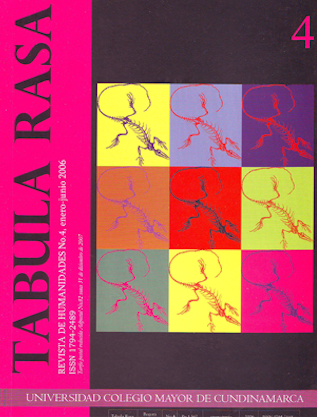Total Challenge: Psychology, psychoanalysis and virtuality
Desafío total: psicología, psicoanálisis y virtualidad
Show authors biography
Speculation around the role of technology and human nature are encountered in science fiction writing, and this writing provides discursive resources for post-industrial subjects. The kinds of futures that are outlined in science fiction help us to understand what kind of subjects some of us have become. New forms of experience, social relations and forms of subjectivity that we find in science fiction are resources examined in this paper, including the way the past is re-presented to us in myriad forms of alternative reality. This article explores the way in which psychoanalytic discourse, pervasive in popular culture, produces forms of subjectivity compatible with contemporary society.
Article visits 296 | PDF visits 195
Downloads
Baudrillard, J. 1990. Revenge of the Crystal: selected writings on the modern object and its destiny, 1968-1983. Londres: Pluto Press.
Benedikt, M. (comp.) 1991. Cyberspace: First Steps. Cambridge, MA.: MIT Press. Burman, E. 1994. Deconstructing Developmental Psychology. Londres:
Routledge [La Deconstrucción de la Psicología Evolutiva, Madrid: Visor, 1998].
Burman, E. (comp.) 1999. Deconstructing Feminist Psychology. Londres: Sage.
Dick, P. K. 1963. The Game Players of Titan. New York: Ace.
Dick, P. K. 1964. Martian Time Slip. Londres: Victor Gollancz
Dick, P. K. 1966. «We Can Remember It For You Wholesale». In P. K. Dick (1991 We Can Remember It For You Wholesale: Collected Stories of Philip K. Dick, Volume 5, (pp. 205 227). Londres: HarperCollins.
Dick, P. K. 1967[1990]. Counter Clock World. Londres: HarperCollins [El mundo contra reloj, Edaf, Colección Ciencia Ficción, nº 25, 1980].
Dick, P. K. 1969[1973]. Ubik. Londres: HarperCollins [Martínez Roca, Colección Superficción, nº 111, 1988].
Forrester, J. 1980. Language and the Origins of Psychoanalysis. Londres: Macmillan.
Foucault, M. 1969[1972]. The Archaeology of Knowledge. Londres: Tavistock [La arqueología del saber, Madrid: Siglo XXI, 1970].
Freedman, C. 1984. «Towards a theory of paranoia: The science fiction of Philip K. Dick». Science Fiction Studies, 11:15-24.
Gergen, K. J. 1991. The Saturated Self. New York: Basic Books [El yo saturado. Barcelona: Paidós, 1992].
Gordo López, A. J. y Cleminson, M. R. 2004. Techno-Sexual Landscapes: Changing Relations Between Technology and Sexuality. Londres: Free Association Books.
Gordo López, A.J. y Macauley, W. R. 1996. «Hibridación y purificación en el espacio cibernético: Una aproximación discursiva». En A.J. Gordo López y J.Linaza (eds.), Psicologías, Discursos y Poder (PDP). Madrid: Visor.
Gordo López, A. J. y Parker, I. (comps.) 1999. Cyberpsychology. Londres: Macmillan. Hebdige, D. 1986. «A Report on the Western Front: Postmodernism and the ‘Politics’ of Style». Block, 12: 4 26.
Ingleby, D. 1985. «Professionals as socializers: the ‘psy complex’». Research in Law, Deviance and Social Control, 7, 79 109.
Jay, M. 1986. «In the Empire of the Gaze: Foucault and the Denigration of Vision in 20th Century French Thought». In L. Appignanesi (Ed Postmodernism, ICA Documents 4 (pp.19 25). Londres: Institute for Contemporary Arts.
Kvale, S. (comp.) 1992. Psychology and Postmodernism. Londres: Sage.
Lacan, J. 1973[1979]. The Four Fundamental Concepts of Psycho Analysis, Harmondsworth: Penguin [Los cuatro conceptos fundamentales del psicoanálisis, Barral]
Lacan, J. 1977. Ecrits. Londres: Tavistock [Escritos, México: Siglo XXI, 1975]
Lasch, C. 1978. The Culture of Narcissism: American life in an age of diminishing expectations.
New York: Norton.
Lyotard, J. F. 1979[1984]. The Postmodern Condition: A report on knowledge. Manchester: Manchester University Press [La condición postmoderna, Madrid: Cátedra, 1984].
Makulowich, J. S. 1993. «Awesome Sites». World Wide Web Newsletter, 1: 13 & 20.
Mandel, E. 1974. Late Capitalism Londres: New Left Books.
Moscovici, S. 1986. La Psychanalyse: Son Image et Son Public (Deuxieme Edn Paris: Presses Universitaires de France.
Parker, I. 1989. The Crisis in Modern Social Psychology, and how to end it. Londres: Routledge. (www.discourseunit.com)
Parker, I. 1992. Discourse Dynamics: Critical Analysis for Social and Individual Psychology. Londres: Routledge. (www.discourseunit.com)
Parker, I. 1997. Psychoanalytic culture: psychoanalytic discourse in western society. Londres: Sage.
Parker, I. 1998 «Against Postmodernism: Psychology in Cultural Context», Theory & Psychology, 8, (5): 621-647
Parker, I. 2002. Critical Discursive Psychology. Londres: Palgrave.
Parker, I. 2004. Slavoj Žižek: A Critical Introduction. Londres: Pluto Press.
Parker, I. 2005. Qualitative Psychology: Introducing Radical Research. Buckingham: Open University Press.
Rorty, R. 1980. Philosophy and the Mirror of Nature. Oxford: Basil Blackwell.
Rose, N. 1985. The Psychological Complex: psychology, politics and society in England 1869 1939. Londres: Routledge & Kegan Paul.
Sutin, L. 1989[1991]. Divine Invasions: A Life of Philip K. Dick. Londres: Paladin.
Verhoeven, P. 1990. Total Recall. New York: Tristar Films [Desafío Total].
Žižek, S. 1989. The Sublime Object of Ideology. Londres: Verso.
Žižek, S. 1990. «Eastern Europe’s republics of Gilead». New Left Review, 183: 50-62.
Žižek, S. 1991. For they know not what they do: Enjoyment as a political factor. Londres: Verso




